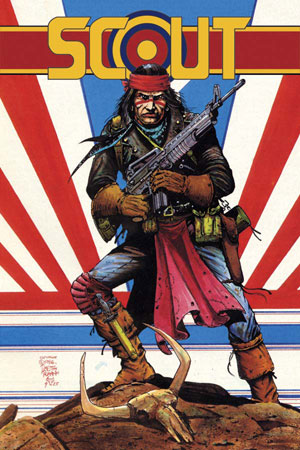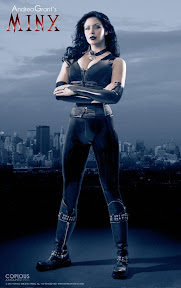
IPI: Indigenous Peeps in the Industry - 05

| In this portion of IPI, we are fortunate to hear from Jon Proudstar, creator of Tribal Force, a comic book featuring Native American superheroes and a historic first for a Native-created comic books, as he shoots the bull with Michael Sheyahshe (me!). In addition to his comic book milestone, Jon is a community leader and Indie filmmaker, working with such Indigenous artists as, Sterlin Harjo (a former classmate of mine, during our time at the University of Oklahoma) and others. I first became acquainted with Jon when he agreed to do an interview about Tribal Force for my book, Native Americans in Comic Books. Since then, Jon and I have continued communicating and sharing ideas about Native American portrayal, both in comic books and in mainstream pop-culture, in general. Here, Jon shares some wisdom and insight from his life experiences about how we Indigenous people can begin telling our own stories (which, if you've read my book, is one of my personal 'soap boxes,' as well). Enjoy. |
JP: I am Yaqui, Jewish, and Mexican
MS: Did you have a lot of cultural interaction growing up? (Family gatherings, dances, ceremonies, etc.?)
JP: It wasn't till I was a teenager that I started to experience Pow Wows and ceremonies. I'm pretty much a City Indian.
MS: When did you first get into comics?
JP: I was about five years old.
MS: Do you have a favorite comic; title or type?
JP: Batman was my first real hero that I was into. Then came Spider-Man! Now, I mainly buy for art! I'm a huge fan of Cave Woman.
MS: Tell us more about the comics you've been working on; how did it all start / come about?
 JP: My book is Tribal Force! It's the first all-Indian super hero comic in the history of the United States! I had always wanted to do an Indian comic book since I was a kid. I grew up in a heavily ethnic neighborhood. It wasn't till I was older that I realized all the heroes in comics where white. I began to contemplate what would happen if the heroes where Indian, Latino, or Black.
JP: My book is Tribal Force! It's the first all-Indian super hero comic in the history of the United States! I had always wanted to do an Indian comic book since I was a kid. I grew up in a heavily ethnic neighborhood. It wasn't till I was older that I realized all the heroes in comics where white. I began to contemplate what would happen if the heroes where Indian, Latino, or Black.The actual story for Tribal Force came about when I was in my early thirties. My book first saw print in 96! (Wow, that was a long time ago.)
Since then, I have been trying to find an Artist with no luck. I have decided to draw the book myself. Sooooo, who knows if my new incarnation of Tribal Force will see the light of day. I'm such a slow Artist! I really don't consider myself an Artist. I'm a writer.
MS: When can we expect to see it?
JP: I hope sometime this year you will see the new book.
MS: Keeping in mind any of your other talents, what is your specialty?
JP: I am an Independent Film Director. My first film DUDE VISION won three awards. I am currently editing my first feature length film THE CHAOS EFFECT, a comedy about dating. Also have another project titled BARKING WATER which will open up at the Sundance Film Festival. This project was Directed by Sterlin Harjo and Chad Burris. Both Natives, yay!
MS: Did you get special training and/or education for the comic book work?
JP: No. But, I had collected and read since the age of five. I had also done mountains of research on Violent Youth Offenders and Survivors Of Child Molestation. That was a huge reason I wanted to put the book out. I always knew our people needed heroes which confronted issues that are important to us.
I can definitely say my screen writing helped me out a lot! The story is the strongest part of any book or movie. With out a good story, it's just a visual thing. Those [type of] projects tend to have short lives.
MS: Have you worked on any other comics?
JP: That's a negative, Ghost Rider.
MS: What are some comics with Native American characters in them that stand out to you?
JP: Obviously the X-Men! When I first saw Thunderbird I thought, "It's about damn time!" [Also,] Scout!

MS: What is your opinion about Indigenous characters in comics? Do you feel we portrayed properly?
JP: Sometimes yes, sometimes no. I have always felt that Tim Truman's Scout has been one of the best portrayals of a Native [character]. Apache, to be more specific. The thing about portraying Native Americans when your not Native is: it's an Indian thing. Most people in America have never met a Native, much less know one. It's like the Golden Rule of writing: "Write What You Know!" Duuuuhhh!
I feel most people who attempt to write about us are confined to what Hollywood has doled out about us. Hollywood tends to keep us in a historical, romanticized view. There are very few films that portray moderns Natives in a realistic light. And even those portrayals are confined to a region. Most people think that all Indians are the same.
So what's the answer? From me, my opinion. Don't write about us. Let us handle the job. I am tired of being portrayed incorrectly by non-Natives. I am tired of seeing my peoples' ways and beliefs prostituted for the benefit of dramatic license.
What's the difference between Natives creating Native heroes and non-Natives [doing so]? It belongs to us. We finally have a voice, after 500 hundred-plus-years of being suppressed and almost killed off. So let me be the first to say "BACK OFF! !" We are here and we will tell our own stories!
This doesn't mean we are beyond help. Of course we need help and guidance in navigating publishing, business and money. But the stories and images must remain ours.
MS: Do you know of any other Natives in the "biz" (comic industry and/or video game industry)?
JP: You.
MS: Any words of wisdom for others (Native or non) looking to do what you do?
JP: Wow! Hmmmmmmmm. Have faith in your ability, learn to accept criticism, be open to new ideas. And if your doing this for the money or fame, good luck! Can't pay the bills with either of those. Be a hard worker. Say what you do and do what you say. The biggest thing in the publishing world is reliability. I know tons of talented Artists and Writers who are not working because they are not reliable.
Oh, and don't talk crap about other comic book people. This business is hard enough!
MS: Thanks, Jon. Always a pleasure...let us know when we can buy the new Tribal Force!













